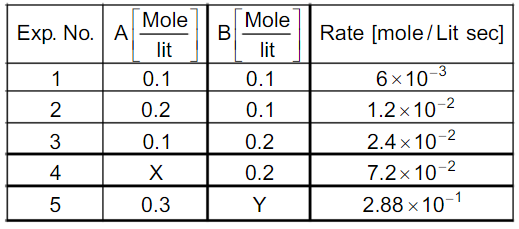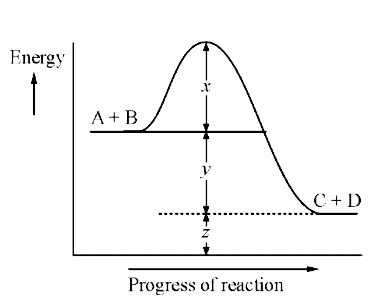A reaction A+B→C+D+q is found to have a positive entropy change, the reaction will be:
Possible at high temperature
Possible only at low temperature
Not possible at any temperature
Possible at any temperature
To determine the spontaneity of the reaction A+B→C+D+q with a positive entropy change, we can analyze the thermodynamic relationship involving Gibbs free energy (ΔG).
1. Understanding the Reaction:
The reaction is given as A+B→C+D+q. Here, q indicates that heat is released, which suggests that the reaction is exothermic.
2. Identify the Thermodynamic Parameters:
- Since heat is released, the enthalpy change (ΔH) for the reaction is negative (ΔH<0).
- The problem states that the entropy change (ΔS) is positive (ΔS>0).
3. Using the Gibbs Free Energy Equation:
The Gibbs free energy change is given by the equation:
ΔG=ΔH−TΔS
For a reaction to be spontaneous, ΔG must be negative (ΔG<0).
4. Analyzing the Sign of ΔG:
- Since ΔH is negative and ΔS is positive, we can substitute these values into the Gibbs free energy equation:
ΔG=(negative)−T×(positive)
- This indicates that ΔG will always be negative regardless of the temperature T because the negative term from ΔH will dominate.
5. Conclusion:
Since ΔG<0 at any temperature, the reaction is spontaneous at all temperatures. Therefore, the correct answer is that the reaction is possible at any temperature.
Final Answer:
The reaction will be possible at any temperature.
---
The reaction is given as A+B→C+D+q. Here, q indicates that heat is released, which suggests that the reaction is exothermic.
- Since heat is released, the enthalpy change (ΔH) for the reaction is negative (ΔH<0).
- The problem states that the entropy change (ΔS) is positive (ΔS>0).
The Gibbs free energy change is given by the equation:
ΔG=ΔH−TΔS
For a reaction to be spontaneous, ΔG must be negative (ΔG<0).
- Since ΔH is negative and ΔS is positive, we can substitute these values into the Gibbs free energy equation:
ΔG=(negative)−T×(positive)
- This indicates that ΔG will always be negative regardless of the temperature T because the negative term from ΔH will dominate.
Since ΔG<0 at any temperature, the reaction is spontaneous at all temperatures. Therefore, the correct answer is that the reaction is possible at any temperature.
The reaction will be possible at any temperature.
Topper's Solved these Questions
- BOOK - CENGAGE CHEMISTRY ENGLISHCHAPTER - THERMODYNAMICSEXERCISE - Exercises (Assertion-Reasoning)23videos
THERMODYNAMICS
- BOOK - CENGAGE CHEMISTRY ENGLISHCHAPTER - THERMODYNAMICSEXERCISE - Exercises (Interger)10videos
THERMODYNAMICS
- BOOK - CENGAGE CHEMISTRY ENGLISHCHAPTER - THERMODYNAMICSEXERCISE - Multiple correct Answer Type2videos
THERMODYNAMICS
- BOOK - CENGAGE CHEMISTRY ENGLISHCHAPTER - STOICHIOMETRYEXERCISE - Archives Subjective33videos
STOICHIOMETRY
Similar Questions
Knowledge Check
- Question 1 - Select One
A reaction A+B→C+D+q is found to have a positive entropy change. The reaction will be
Apossible at high temperatureBpossible only at low temperatureCnot possible at any temperatureDpossible at any temperature. - Question 2 - Select One
ΔG is the net energy available to do useful work and is a measure of free energy. If a reaction has positive enthalpy change and positive entropy change, under what conditions will the reaction be spontaneous?
AΔG will be positive at low temperature hence reaction is spontaneous at low temperature.BΔG is negative at high temperature hence reaction is spontaneous at high temperature.CΔG is negative at low temperature.DΔG is negative at all temperature hence reaction is spontaneous at all temperatures. - Question 3 - Select One
In a reaction P+Q→R+S, there is no change in entropy, Enthalpy change for the reaction (ΔH) is 12 kJ mol−1. Under what conditions, reaction will have negative value of free energy change?
AIf ΔH is positiveBIf ΔH is negative.CIf ΔH is 24 kJ mol−1.DIf temperature of reaction is high
For the reaction
2A+B→C

Find X & Y.View SolutionIn the reaction A+B→C+D, the concentration of A and B are equal and the rate of the reaction is rate =k[A][B]. The integrated rate equation for this reaction is
View SolutionFor a chemical reaction A→B, it is found that the rate of reaction doubles when the concentration of A is increased 4 times. What is the order of reaction ? Suggest the rate law also.
View SolutionFor the reaction A+B→C+D, doubling the concentration of both the reactants increases the reaction rate by 8 times and doubling the initial concentration of only B ismply doubles the reaction rate. What is the rate law for the reaction ?
View SolutionGiven the following diagram for the reaction A+B→C+D The enthalpy change and activation energy for the reverse reaction, C+D→A+B are respectively.
 View Solution
View Solution

